By Rob Smentek
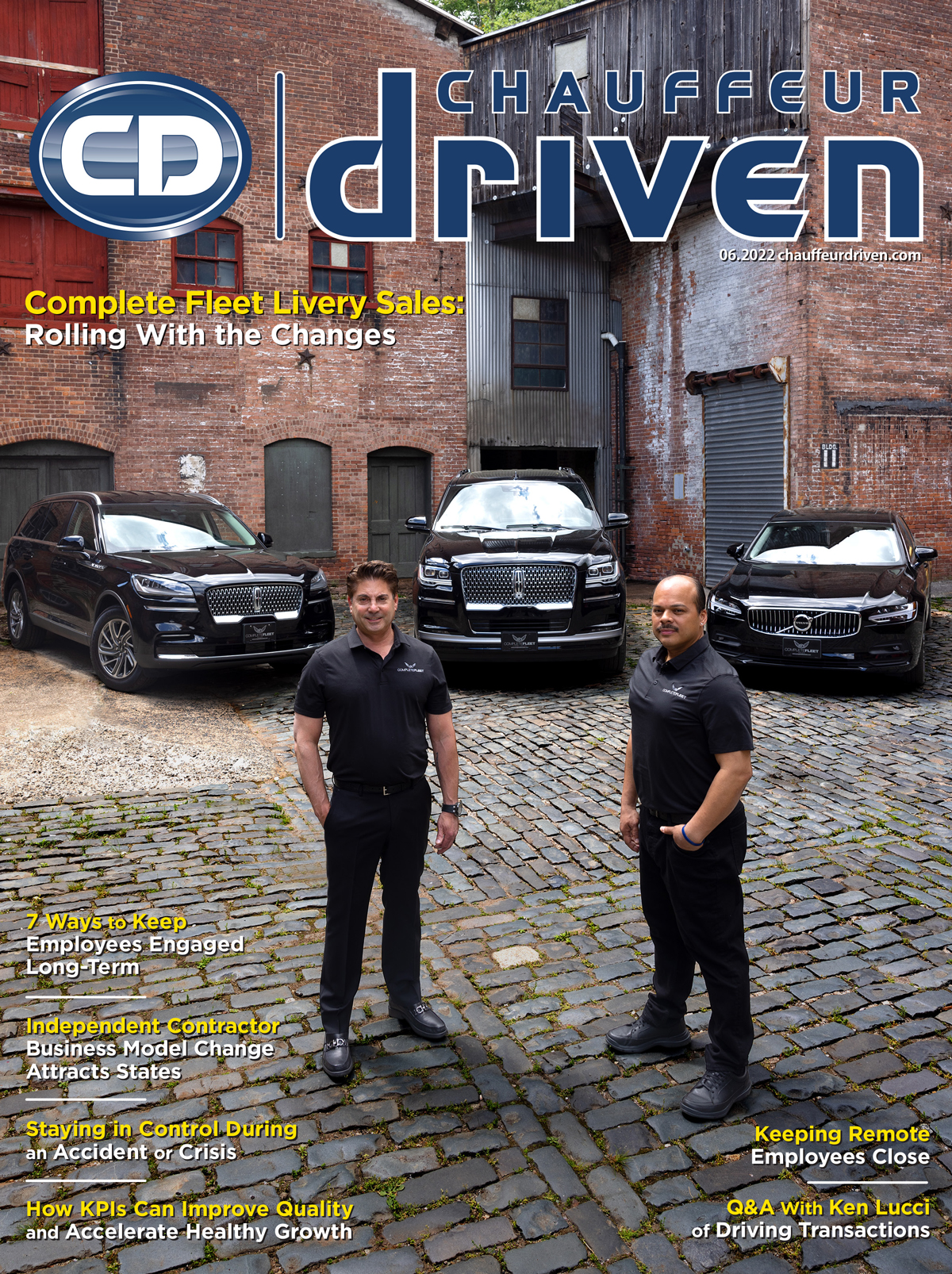 Cover Art: Complete Fleet Livery Sales President Barry Trabb (left) and Financing Expert Dino Olivares with their latest products from Lincoln and Volvo at the Art Factory Studios in Paterson, N.J. Photography by Craig Smith of Special 1 Media.
Despite the challenges posed by the post-pandemic marketplace, Complete Fleet Livery Sales remains poised to deliver its trustworthy customer service and top-of-the-line vehicles to the chauffeured transportation industry.
Cover Art: Complete Fleet Livery Sales President Barry Trabb (left) and Financing Expert Dino Olivares with their latest products from Lincoln and Volvo at the Art Factory Studios in Paterson, N.J. Photography by Craig Smith of Special 1 Media.
Despite the challenges posed by the post-pandemic marketplace, Complete Fleet Livery Sales remains poised to deliver its trustworthy customer service and top-of-the-line vehicles to the chauffeured transportation industry.
Like the rest of the industry, Complete Fleet Livery Sales President Barry Trabb was unprepared for the effects of the COVID pandemic. In early 2020, the veteran dealer was completely sold out of inventory, but when March hit, most of those orders were canceled. “We were baffled by what was happening. Like most people, we were so uncertain of the future and did not consider the long-term effect a pandemic would have on business” says Trabb. “Over the course of 2020, sales were bleak, and the phones were just not ringing. It was a scary time, for sure.”
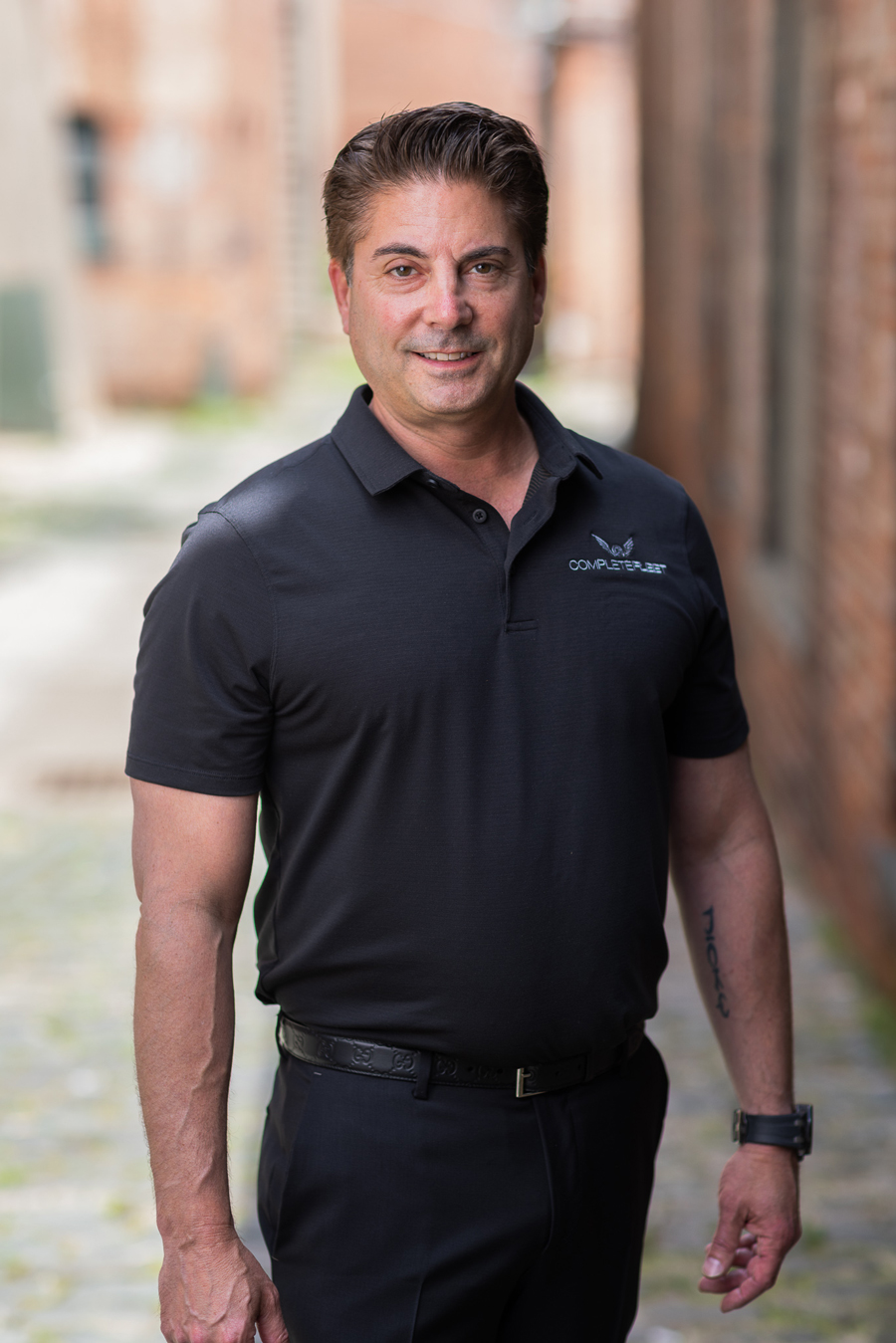 Complete Fleet Livery Sales President Barry Trabb
However, after more than three decades in the industry, Trabb wasn’t willing to quit. He worked remotely for a month, before returning to Complete Fleet’s office in Union, N.J., and he did his best to keep busy. Much of his day was spent maintaining unsold inventory and thinking of new ways to assist his clients. Most importantly, however, the unexpected downtime was advantageous to more deeply connecting with his client base, many of whom he considers family.
Complete Fleet Livery Sales President Barry Trabb
However, after more than three decades in the industry, Trabb wasn’t willing to quit. He worked remotely for a month, before returning to Complete Fleet’s office in Union, N.J., and he did his best to keep busy. Much of his day was spent maintaining unsold inventory and thinking of new ways to assist his clients. Most importantly, however, the unexpected downtime was advantageous to more deeply connecting with his client base, many of whom he considers family.
“I communicated a lot with clients during that time in a way that I never did before because we didn’t have that kind of time on our hands prior to COVID. I was able to speak weekly with some customers who I would only get a chance to talk to when they needed cars. Getting to know our customers on a more personal level and offering support to them was great! Clients would call in or even Facetime and ask, ‘how’s your family, how are you doing?’ There was a big push to make sure everyone was safe and looking out for each other. We all needed that interaction. It was a bonus through COVID.”
While many operators were selling off their fleets to reduce their overhead, Trabb wasn’t disheartened. In fact, he kept a keen eye on the future of the marketplace.
“Honestly, I saw the writing on the wall. With everyone downsizing their fleets, I knew that there’d soon be a turn. The pandemic wasn’t going to last forever. For however long we’d be on the sidelines, our customers’ cars were still going to clock up miles. Thankfully, our clients were still in business and keeping their employees on. People were still moving.”
Among those companies still moving forward was Ford-Lincoln. In early 2021, Lincoln unveiled a new three-row, seven-passenger Aviator SUV as part of the Livery Vehicle lineup. For a dealer like Trabb, this required him to enlist a bit of foresight.
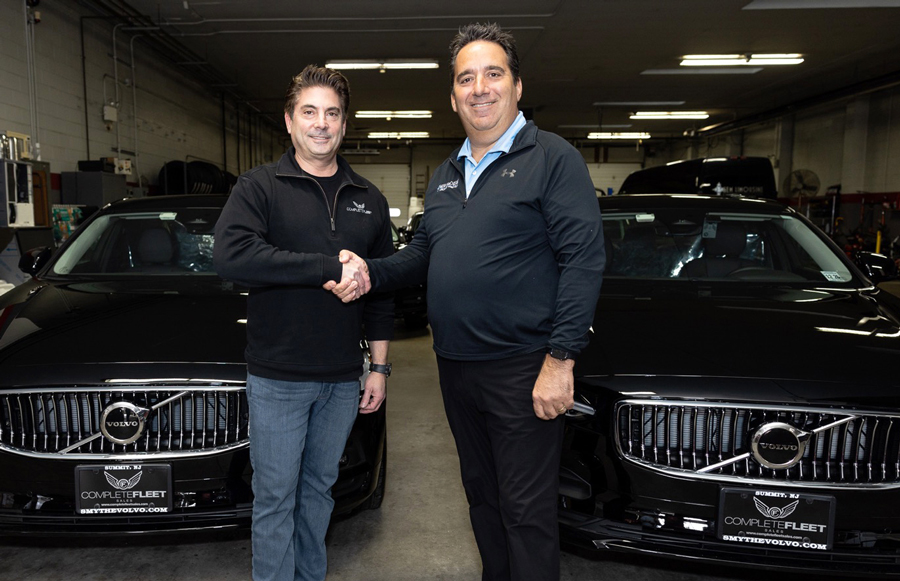 Barry Trabb (left) with longtime client Joe Guilino of Gem Limousine with two Volvo S90 sedans
“Little by little I started to see things come back. When Lincoln introduced the Aviator, I had a fair number of cars on the ground. So, I had a decision to make. I knew I probably wasn’t going to see [the Aviators] for five to six months, so it was like looking at a crystal ball. My mindset was to start the wheels turning and plan for the recovery. I made the decision to place an order for those Aviators.”
Barry Trabb (left) with longtime client Joe Guilino of Gem Limousine with two Volvo S90 sedans
“Little by little I started to see things come back. When Lincoln introduced the Aviator, I had a fair number of cars on the ground. So, I had a decision to make. I knew I probably wasn’t going to see [the Aviators] for five to six months, so it was like looking at a crystal ball. My mindset was to start the wheels turning and plan for the recovery. I made the decision to place an order for those Aviators.”
In March 2021, Trabb discounted his existing inventory and saw a big influx of business. His clients realized that the downturn was not permanent, and the price was right to add cars to their fleets.
“‘I know I’m going to need a car eventually’ was everyone’s mentality,” explains Trabb. “Things began picking up month over month. Soon, when people were calling, we didn’t have any inventory in stock. It wasn’t even about manufacturing shortages at that point; it was about trying to determine what people would want, and how to meet the demand.”
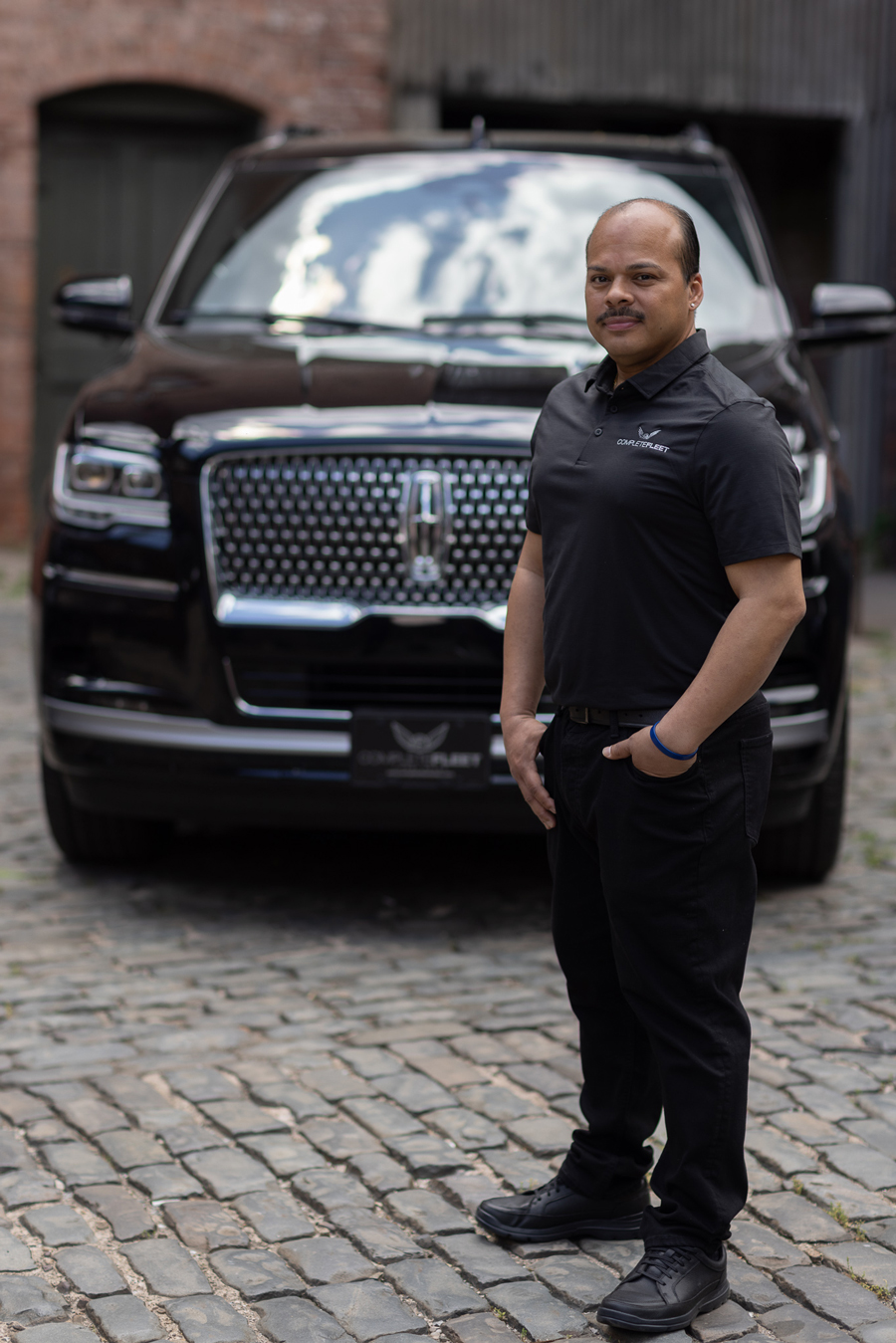 Complete Fleet Livery Sales Financing Expert Dino Olivares
That demand has increased into a veritable feeding frenzy for vehicles. As the ground transportation industry bounced back from the pandemic, operators have found themselves busier than ever, and are actively seeking to replenish the fleet vehicles that were sold off in 2020 or turn over fleet that has aged out. What’s more, manufacturing delays, caused by those dreaded “supply chain issues,” have caused a shortage of vehicles, making the demand even greater.
Complete Fleet Livery Sales Financing Expert Dino Olivares
That demand has increased into a veritable feeding frenzy for vehicles. As the ground transportation industry bounced back from the pandemic, operators have found themselves busier than ever, and are actively seeking to replenish the fleet vehicles that were sold off in 2020 or turn over fleet that has aged out. What’s more, manufacturing delays, caused by those dreaded “supply chain issues,” have caused a shortage of vehicles, making the demand even greater.
“The message I’m trying to convey to people is that times are different,” admits Trabb. “You can’t just walk into a dealership and drive away with a car anymore. You need to plan your purchases and think ahead. Try and forecast ... the only way to get a vehicle is to place an order three or four months out. You can’t pick up the phone and say, ‘I want a car, how soon can I get it?’ For now, those days are over.”
Nonetheless, Trabb and Complete Fleet have had a great deal of success with the Aviator, a vehicle that appeals to both operators and their clients.
“The Aviator SUV is doing well. It’s been well received by the industry. It’s very versatile and streamlined, and it’s got a great stance when it pulls up at a residence or corporate office,” says Trabb.
Similarly, the Volvo S90 sedan has been steadily in demand at Complete Fleet. “The S90 is a sharp vehicle. We’re seeing a lot of demand for it, and Volvo is committed to having a sedan for our industry.”
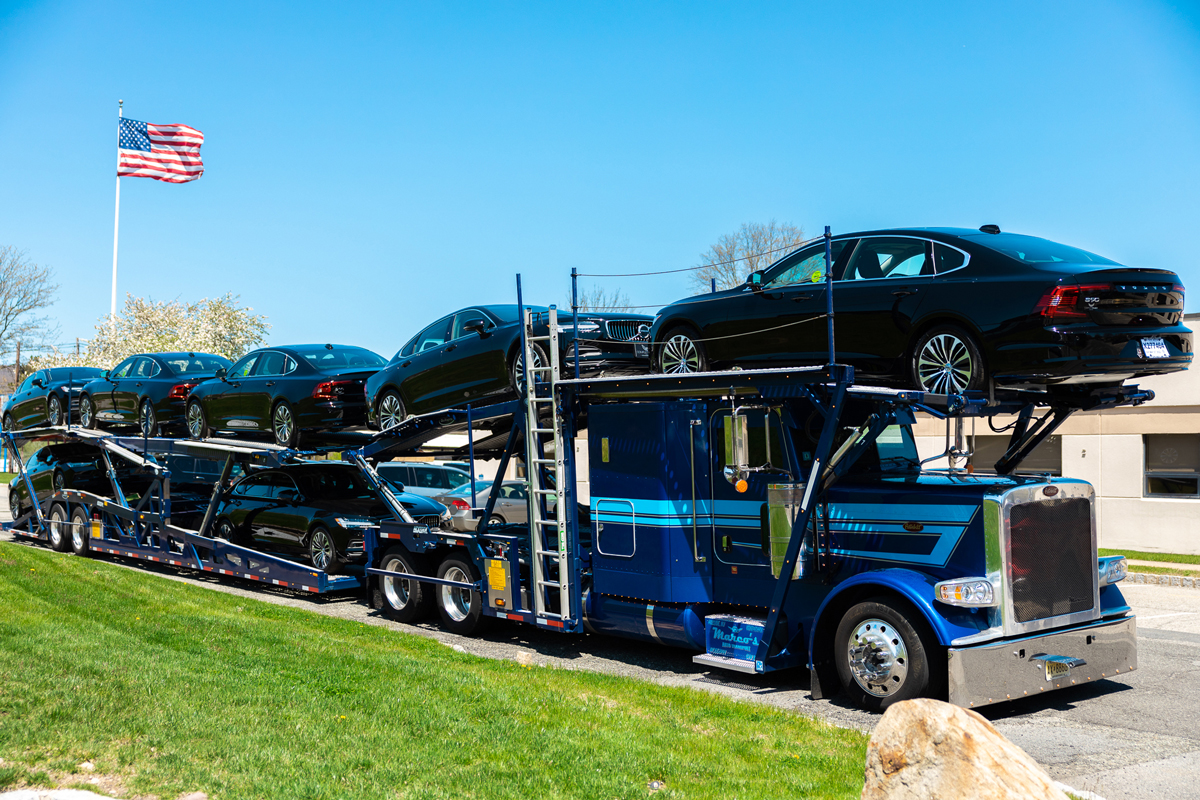 Volvo S90 sedans loaded on a vehicle transport
Trabb is thankful for the support he’s received from manufacturers during the past two years. Industry stalwarts like Ford-Lincoln Livery Fleet Marketing Manager Kimberly Johnston and Volvo Commercial Fleet Manager Erik Asplund have maintained a close relationship with the dealer.
Volvo S90 sedans loaded on a vehicle transport
Trabb is thankful for the support he’s received from manufacturers during the past two years. Industry stalwarts like Ford-Lincoln Livery Fleet Marketing Manager Kimberly Johnston and Volvo Commercial Fleet Manager Erik Asplund have maintained a close relationship with the dealer.
“Ford-Lincoln and Volvo have been extremely supportive,” says Trabb. “They’ve always been campaigning for us behind the scenes. People don’t realize, at the end of the day, that we’re a tiny segment for Ford-Lincoln and Volvo. The fact that they’re still committed to the industry—participating in trade shows and limousine associations—and still supporting us with several vehicle lines is fantastic. And it’s not just the car. They give us special pricing and extended warranties. Plus, they’re helping me as a dealer to keep cars in stock.”
Having those vehicles available has opened Complete Fleet to a national marketplace, far beyond the N.J./N.Y. area they call home. Trabb works with nationwide transporters to deliver vehicles as far away as Texas and California.
“It may not be a customer’s first choice to ship a car to California from N.J., but in today’s market, if you need a car, it may be the only solution. Thankfully, I can get a car on a transporter just a few days after the deal is completed.”
The e-documents and electronic DocuSign capabilities that companies like Ford-Lincoln and Ally Bank put into place during the pandemic have also streamlined the process in selling cars across state lines, notes Trabb. “Whereas, before, you’d have to FedEx contracts/documents, DocuSign allows them to process the deal so much faster, where it would have taken several days in the past.”
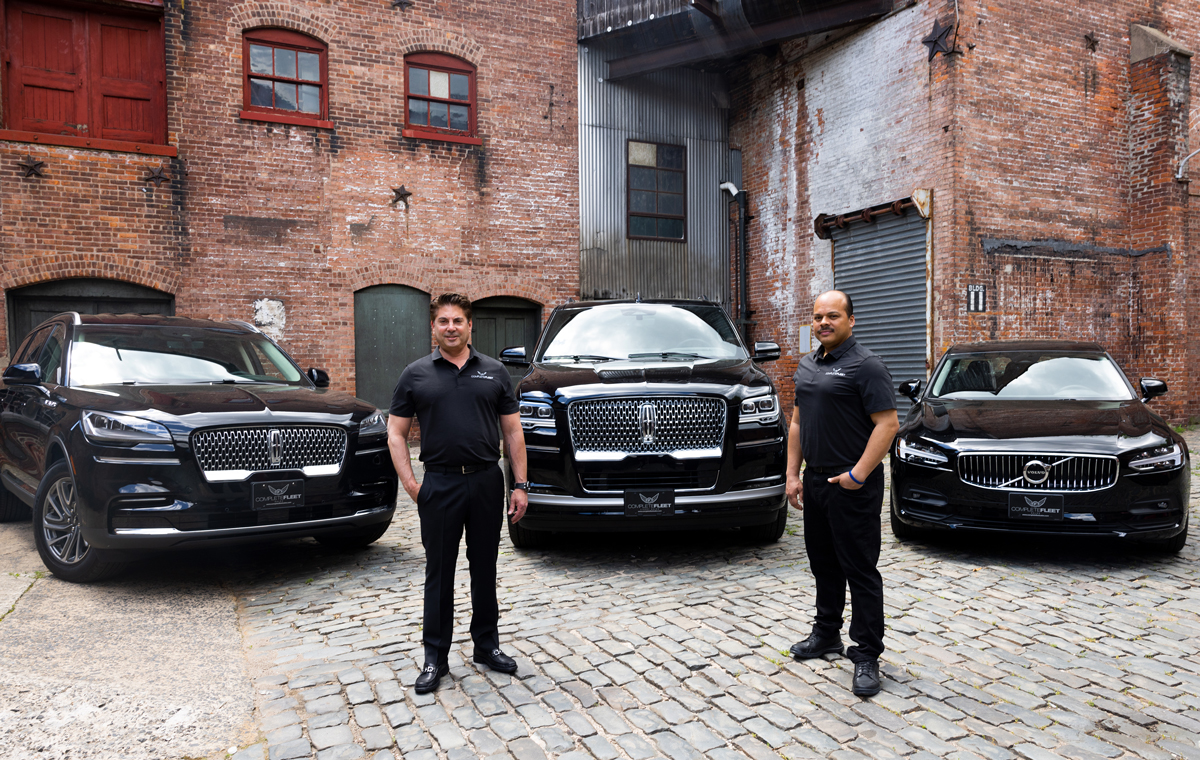 Complete Fleet Livery Sales President Barry Trabb (left) with Financing Expert Dino Olivares at the Art Factory Studios in Paterson, N.J. (pictured left to right: Lincoln Aviator, Lincoln Navigator, and Volvo S90)
Not only did COVID alter the socio-economic landscape and auto market, but it also brought about changes in the Complete Fleet team. Sales Expert Bruce Cirlin used the downtime of the pandemic to set off on his retirement from the company. A beloved fixture in the industry, Cirlin was recognized by clients and peers for his customer service skills and warm personality.
Complete Fleet Livery Sales President Barry Trabb (left) with Financing Expert Dino Olivares at the Art Factory Studios in Paterson, N.J. (pictured left to right: Lincoln Aviator, Lincoln Navigator, and Volvo S90)
Not only did COVID alter the socio-economic landscape and auto market, but it also brought about changes in the Complete Fleet team. Sales Expert Bruce Cirlin used the downtime of the pandemic to set off on his retirement from the company. A beloved fixture in the industry, Cirlin was recognized by clients and peers for his customer service skills and warm personality.
“Bruce and I have worked together for more than 20 years. We shared many great moments in and out of the office,” says Trabb. “We feel the void without him around the office. He had a long list loyal clients and serviced some of them for his entire career.” (See page 20 for more on Cirlin)
As far as keeping things rolling within the company, Trabb credits Financing Expert Dino Olivares.
“Dino is really the heart of our operation, he has great a great understanding of the financing process and has been with us for 16 years this August. He handles all the billing, and his paperwork and DMV knowledge is a great attribute. In addition, Dino manages all the paperwork to secure funding from our lending institutions, so the dealership gets funded faster, which speeds up the delivery process. Our customers want the process of buying a vehicle to be fast and easy, and Dino delivers.”
The Complete Fleet team is rounded off by Worldwide Business Development Representative Les Meyer, who joined the organization close to five years ago.
“Les is still active with Complete Fleet and always looking to put a deal together. He’s very spirited and has so much energy. He’s an inspiration and a great man; I’m proud that he’s part of the team.”
According to Trabb, there’s a distinction in dealing with fleet specialists that puts operators at an advantage.
“For us, it’s about customer service and customer relations. I can get in touch with the Ford-Lincoln and Volvo teams if there’s a problem. Whereas if you go to a regular dealer, nine times out of 10, they’re not going to be able to help you directly. They’ll push you back to someone in service, and who knows where you’ll go from there. With me and my team, we follow up with customers. We make sure everything is OK with the vehicle, make sure they got the proper paperwork, and—the biggest thing—if there is a problem, we’ll put you in touch with someone from the OEM and get it resolved. We’re a strong voice for the operator, and whether you have one car or 1,500 cars, we want to make our clients happy. That’s where we separate ourselves from the competition.” [CD0622]

